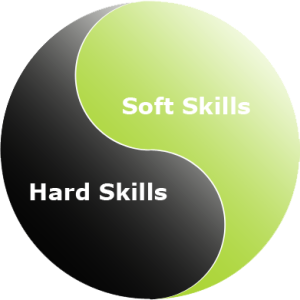Source: http://bit.ly/1zbuq2G
When looking for their potential employees, employers take into consideration two main things: hard skills and soft skills. Hard skills are abilities acquired through learning and practice and are often task specific. On the other hand, soft skills are personal attributes that mostly involve interaction with other people. Although hard skills appears good in your resume and can get you an interview, soft skills are necessary to obtain and keep a job.
Source: http://bit.ly/1qwQOyg
For aspiring computer scientists such as myself, five technical skills that employers look for are proficiency in technical writing, data documentation and analysis, project management, branding, and public speaking. Technical writing is essential because it provides a framework for any process or product. Similarly, data documentation and analysis provides a foundation for a written report. Project management is as vital since computer scientists work with different types of project that requires thorough planning for utilizing resources well and avoiding risks. Both branding and public speaking is required since it is the key to marketing and expanding the client’s audience.
Currently, I am able to apply and improve these skills as my team and I use the agile methodology in our project. Enhancing your technical writing skills is simple and easy. For instance, by posting a blog about agile every week, not only am I introducing a new concept to my audience, but I am also able to exercise my writing skills. In my current project, we have weekly reports to analyze and evaluate our progress. These reports are also used for us to improve the project management for the following iterations. We also recommended other students to check the clients’ websites and utilize the available resources. As we get done with our final sprint, we will need to apply our public speaking skills when presenting our product.
Source: http://bit.ly/1zDJ9qc
Both hard skills and soft skills are required to be successful in a job. In fact, a survey conducted by TD magazine (2014) shows result indicating that majority of managers value soft skills over hard skills (p. 19). Working in retail for over a year now, I have developed soft skills that I highly believe put me on top. Recently, my department leader complimented me for my optimism and how my coworkers enjoy working with me. This optimism is also what helps me adapt to changes easily. Along with my positive attitude and flexibility, the other soft skills that I am proud of are flexibility, good communication skills, being a great team player, and time management. By helping different customers every day at work, I learned how to change my communication style depending on what best suit the situation. Before responding to anything, I make sure that I listen to what the customer have to say. Once I evaluate the situation, I word my statements in a way that helps me develop a good relationship with them. My job department also have a monthly goal, which is hitting revenue and obtaining a certain number of repairs. My team works together to achieve these goals by offering and receiving constructive suggestions. Additionally, since I have tasks assigned each day for work and the client coming in is unpredictable, I have learned to prioritize the more important tasks. As Burstein (2014) mentioned in her articles, there are many college graduates who lack soft skills preferred by employees and that’s why I believe that my soft skills make me exceptional.
References
Burstein, R. (2014). Here are the crucial job skills employers are really looking for. Time. Retrieved November 2, 2014.
Personality is more important than hard skills, managers say. (2014). T D, 68(7), 19-19.



Very illustrative clear images. It really helps me that you are listing the characteristics of hard skills, respectively soft skills. Most pages are listing examples of what they are, and even though direct examples can be very telling and helpful, understanding will always help more. Understanding the real reasons for what makes a skill hard or soft, is more helpful in the long run. This will help many readers to be able to differentiate their hard/technical skills, and their soft skills when they type up their résumés.
LikeLike
Jean, thanks for sharing your personal experiences. Good job for receiving manager’s compliment. I agree that soft skills are as important as hard skills, if not more. You’ve made a good point that employers want to see people who can write technically. As I see it being a top requirements for every internship that I am interested in.
LikeLike